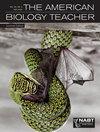Exploring Phytoplankton Population Investigation Growth to Enhance Quantitative Literacy
IF 0.3
4区 教育学
Q4 BIOLOGY
引用次数: 3
Abstract
Quantitative literacy is essential to biological literacy (and is one of the core concepts in Vision and Change in Undergraduate Biology Education: A Call to Action; [AAAS 2009][1]). Building quantitative literacy is a challenging endeavor for biology instructors. Integrating mathematical skills into biological investigations can help build quantitative literacy. In our plankton population laboratory sequence, students test hypotheses about the influence of abiotic factors on phytoplankton populations by sampling experimental and control flasks over multiple weeks. Students track and predict changes in planktonic populations by incorporating weekly sample estimates into population growth equations. We have refined the laboratory protocols on the basis of student commentary and instructor observations. Students have reviewed the lab positively, and approximately one-quarter of them reported building their math skills by participating in the lab. [1]: #ref-1探索浮游植物种群调查增长提高定量素养
定量素养是生物素养的基础,也是《本科生物教育的愿景与变革:行动的呼唤》一书的核心概念之一。[AAAS 2009][1])。培养定量素养对生物教师来说是一项具有挑战性的工作。将数学技能整合到生物调查中可以帮助培养定量素养。在我们的浮游生物种群实验室序列中,学生们在数周内通过取样实验瓶和对照瓶来测试关于非生物因素对浮游植物种群影响的假设。学生们通过将每周的样本估计值纳入种群增长方程来跟踪和预测浮游生物种群的变化。我们在学生评论和教师观察的基础上完善了实验方案。学生们对实验室的评价是积极的,大约四分之一的学生报告说他们通过参加实验室提高了数学技能。[1]: # ref-1
本文章由计算机程序翻译,如有差异,请以英文原文为准。
求助全文
约1分钟内获得全文
求助全文
来源期刊

American Biology Teacher
BIOLOGY-EDUCATION, SCIENTIFIC DISCIPLINES
CiteScore
0.80
自引率
20.00%
发文量
108
期刊介绍:
The American Biology Teacher is an award winning and peer-refereed professional journal for K-16 biology teachers. Articles include topics such as modern biology content, biology teaching strategies for both the classroom and laboratory, field activities, and a wide range of assistance for application and professional development. Each issue features reviews of books, classroom technology products, and "Biology Today." Published 9 times a year, the journal also covers the social and ethical implications of biology and ways to incorporate such concerns into instructional programs.
 求助内容:
求助内容: 应助结果提醒方式:
应助结果提醒方式:


